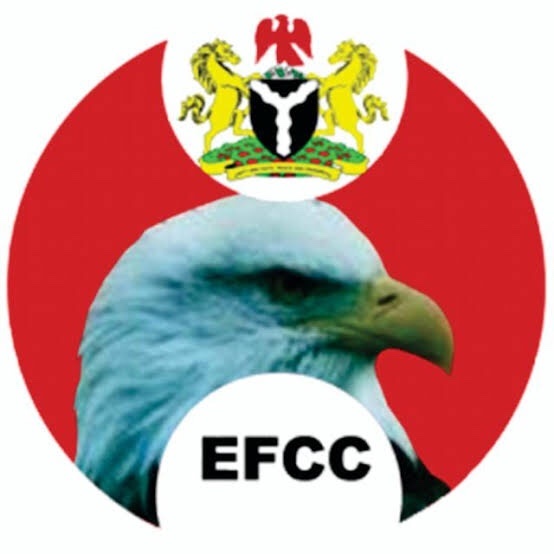EFCC; Functions and other details
 The Economic and Financials Crimes Commission (EFCC) was established in 2003 by the President Olusegun Obasanjo Regime. EFCC is a law enforcement agency charged with the responsibility of investigating financial crimes and money laundering.
The Economic and Financials Crimes Commission (EFCC) was established in 2003 by the President Olusegun Obasanjo Regime. EFCC is a law enforcement agency charged with the responsibility of investigating financial crimes and money laundering.
History and Chairman of EFCC
The Economic and Financials Crimes Commission (EFCC) was established after the Financial Action Task Force on Money Laundering (FATF) ranked Nigeria as one of the countries that is not cooperative in the international community’s efforts to fight money laundering.
After the establishment of EFCC, Nuhu Ribadu was appointed the Chairman of EFCC. By 2005, the commission has made notable arrests including Diepreye Alamieyeseigha.
By September 2006, EFCC was investigating 31 of 36 governors for various financial crimes. In 2008, EFCC launched an investigation against Senator Iyabo Obasanjo-Bello, the daughter of former president Olusegun Obasanjo for receiving N10 million ($100,000).
In June 2008, Nuhu Ribadu was replaced as EFCC Chairman by Chief (Mrs) Farida Mzamber Waziri. The Economic And Financials Crimes Commission launched a website that contains the list of most wanted criminals
In November 2011, Ibrahim Lamborde was appointed by Goodluck Jonathan as the new chairman of EFCC. Lamborde was confirmed by the Nigerian Senate in November 2012.
List of EFCC Chairman till Date
|
EFCC Chairman |
Date |
|
Nuhu Ribadu |
2003-2007 |
|
Ibrahim Lamborde |
2007-2008 (Acting Chairman) |
|
Chief (Mrs) Farida Mzamber Waziri |
2008-2011 |
|
Ibrahim Lamborde |
2011-2015 |
|
Ibrahim Magu |
2015- 2020 |
|
Mohammed Umar |
2020-2021 (Ag Chairman) |
|
Abdulrasheed Bawa |
2021- till date |
Functions of EFCC
The Economic and Financials Crimes Commission (EFCC) is charged with the following functions
- Investigating and enforcing laws against economic and financial crimes
- Adopt measures to identify, trace, freeze, confiscate or seize proceeds derived from terrorist activities, economic and financial crimes
- Adopt measures to eradicate the commission of economic and financial crimes
- Facilitate rapid exchange of scientific and technical information and the conduct of joint operations geared towards the eradication of economic and financial crimes
- Examine and investigate all reported cases of economic and financial crimes
- Determine the extent of financial loss and such other losses by government, private individuals or organizations;
- Collaborate with government bodies both within and outside Nigeria carrying on functions wholly or in part analogous with those of the Commission concerning
- Identify and determine the whereabouts and activities of suspects
- Movement of proceeds or properties derived from the commission of economic and financial and other related crimes
- Establish and maintain a system for monitoring international economic and financial crimes in order to identify suspicious transactions and persons involved
- Maintain data, statistics, records and reports on person, organizations, proceeds, properties, documents or other items or assets involved in economic and financial crimes
- undertake research and similar works with a view to determining the manifestation, extent, magnitude, and effects of economic and financial crimes and advising government on appropriate intervention measures for combating same
- deal with matters connected with the extradition, deportation and mutual legal or other assistance between Nigeria and any other country involving Economic and Financial Crimes
- collection of all reports relating suspicious financial transactions, analyse and disseminate to all relevant Government agencies
- take charge of, supervising, controlling, coordinating all the responsibilities, functions and activities relating to the current investigation and prosecution of all offenses connected with or relating to economic and financial crimes
- coordinate all existing economic and financial crimes, investigating units in Nigeria
- maintain a liaison with office of the Attorney-General of the Federation, the Nigerian Customs Service, the Immigration and Prison Service Board, the Central Bank of Nigeria, the Nigeria Deposit Insurance Corporation, the National Drug Law Enforcement Agency, all government security and law enforcement agencies and such other financial supervisory institutions in the eradication of economic and financial crime
- carry out and sustain rigorous public and enlightenment campaign against economic and financial crimes within and outside Nigeria
- carry out such other activities as are necessary or expedient for the full discharge of all or any of the functions conferred on it under this Act.



